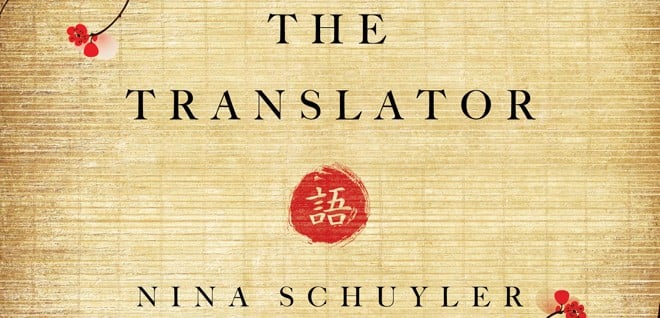
A novel examining human relationships through literary translations

It is a breath of fresh air when an American novel steps out of its parochial, self-obsessed concerns. Schuyler’s The Translator, her second novel, makes a good attempt at that. In doing so she offers an interesting twist, a meditation on the word ‘translator’ by turning another human being akin to a text written in a language that you have acquired by hard work, by studying it as a professional, as an academic. As if therein lies the error.
Not that another human being is not a text but to study, understand another being with the rationalist coolness of an academic, a scientist is to strip the subject of one’s examination of her humanity. Nina Schuyler suggests the same may be true when we engage with a text. That language is a living organism, that in order for a translator to create a bridge between the two languages, the original and the target, one has to tread with a feeling, an emotional engagement with the structure under one’s feet.
Blind dependence on one’s rationalist approach will allow the reader to find fault with the bridge, the text, the human we are trying to understand, and thus arrive at the wrong or altered destination.
The protagonist of the novel Hanne Schubert of German-Dutch stock was married to a Japanese man and had two children. The two separated for rather mundane reasons, and as the children Tomas and Brigitte moved to San Francisco with their mother, the toll is the severest on the young girl. Hanne is unable to bridge the gap -- love, trust, intimacy -- between her and the daughter, paving a way for the daughter’s growing rebellious behaviour to the point where, Hanne is convinced, parental intervention is needed.
Brigitte is taken to a boarding school, and even though Brigitte pleads and begs -- this perhaps is the most poignant part of the novel -- the rationalist, the Saxon blood in her veins subdues the maternal instinct. This serves to break the bridge of reconciliation. Hanne is pained that she has lost her daughter though she is in somewhat of a denial.
The novel starts with a cerebral structure and ends in an emotional one. As a translator of a Japanese novel we see sentences layered with the original, the translation, and the translator’s authorial penetration. As a reader it made me sit up and take notice, thinking, salivating at the thought the novel was going to be an intellectual roller coaster distantly reminiscent of Autumn of the Patriarch by Garcia Marquez or Zone by Mathias Enard. But the protagonist takes a fall rendering her incapable of speaking English but not Japanese, prompting her to accept an invitation to a conference in Japan. The trip shatters, yet helps her find herself.
Therein lies the problem I have with the novel despite it being an engaging endeavour.
Schuyler’s execution of the narrative -- that when parents fail to reach the aching heart of their children, the key is understanding through love, tenderness, compassion, not order, discipline, rationalism -- is based on a dichotomous presupposition of how the heartless west stands in stark opposition to the emotional, more human east.
Hanne Schubert’s short affair with Moto Okuro, the Noh stage actor, whom the Japanese novel’s main character is based on, allows her to see her approach to life as fundamentally erroneous. Her approach to the novel suffered from the same mistaken assumptions about a character’s inner life as those she held towards her daughter.
This east versus west paradigm becomes uneasy in the last part of the novel -- emphasising forgiveness and reconciliation -- as it further problematises the tenuous divide and flirts with what some might call poverty porn. The daughter has joined an ashram in India and has taken a spiritual path, it is implied, in opposition to her mother’s. The mother has to reach her for forgiveness and a new beginning. The mighty forces above have returned her English to her in the meantime.
The India we see, right off the bat, is nothing but noise and poverty. The driver she hires cranks up American rock and roll music and she sees are "cars, motorcycles, rickshaws, bikes, oxen, starving dogs, and emaciated cows wandering the sidewalks and streets. It is a collision of civilisation -- if it can be called that -- and rural life."
As I suggested that it felt like a breath of fresh air when an American novel breaks free of its narrow geographical constraints. But it is equally important to break the narrow emotional constraints as well. Both Japan and India have been used as a landscape, a backdrop where western problems are solved, a sort of a blackboard where Hanne’s issues can be worked out.
If Japan is erected as an antidote to Hanne’s controlled emotional compartmentalisation, India is more human than the capitalist, over-affluent US where children are spoiled because they don’t know what poverty is. I enjoyed the son and mother dynamic in the novel, but perhaps Schuylen should have explored more about the American family dynamic, or the lack of it; that’s more responsible for why things went wrong between the daughter and mother. If Hanne had a family and neighbourhood support network, Brigitte probably had not fallen through.
Still these are minor quibbles when The Translator is considered in its entirety.